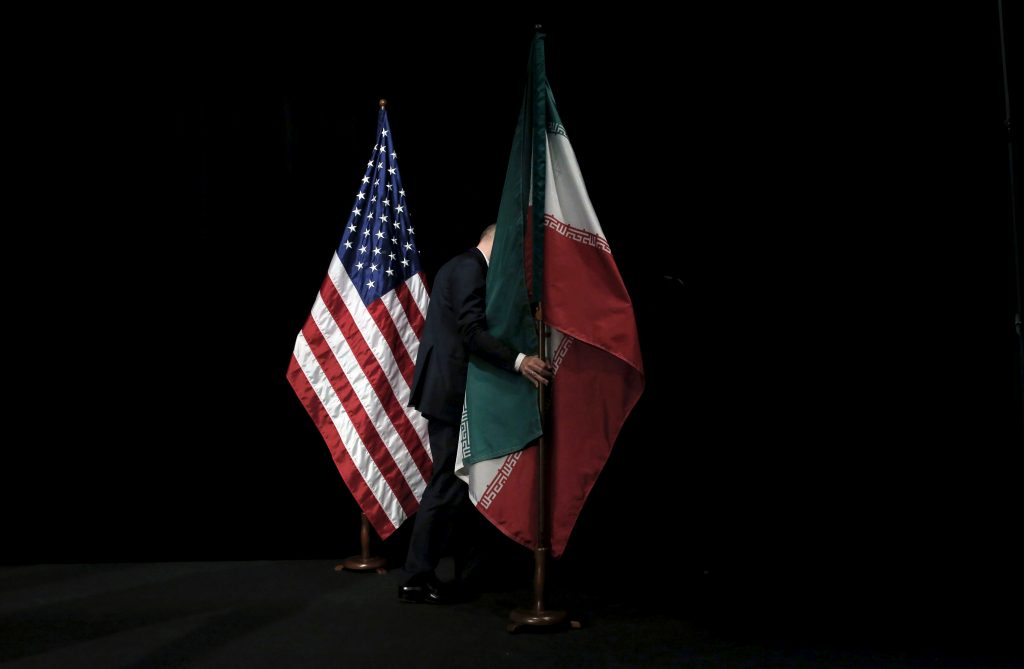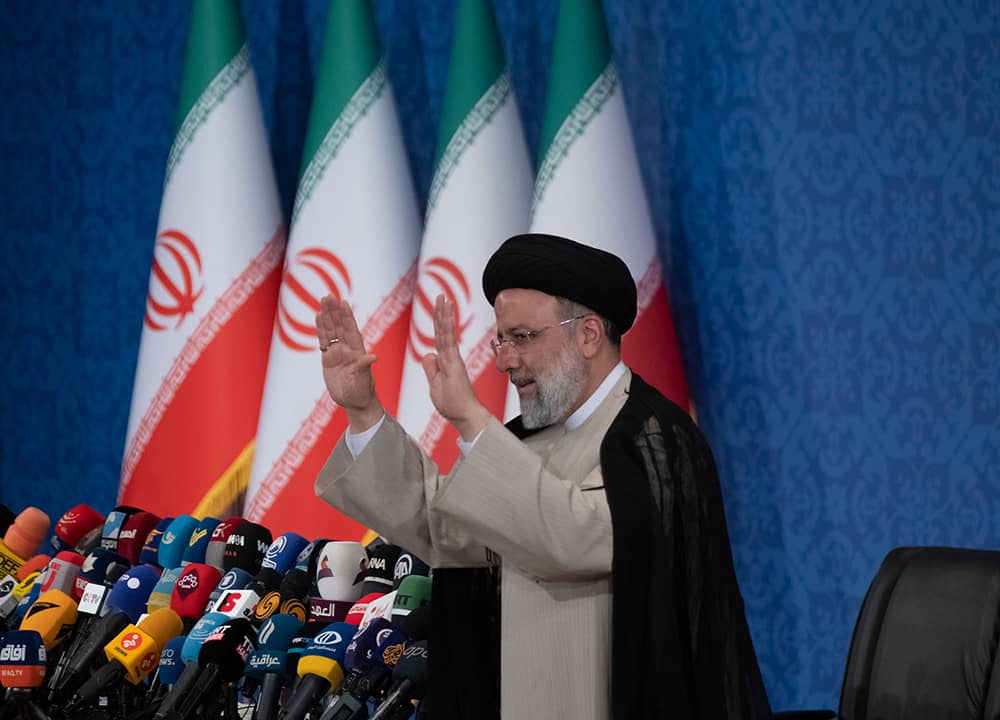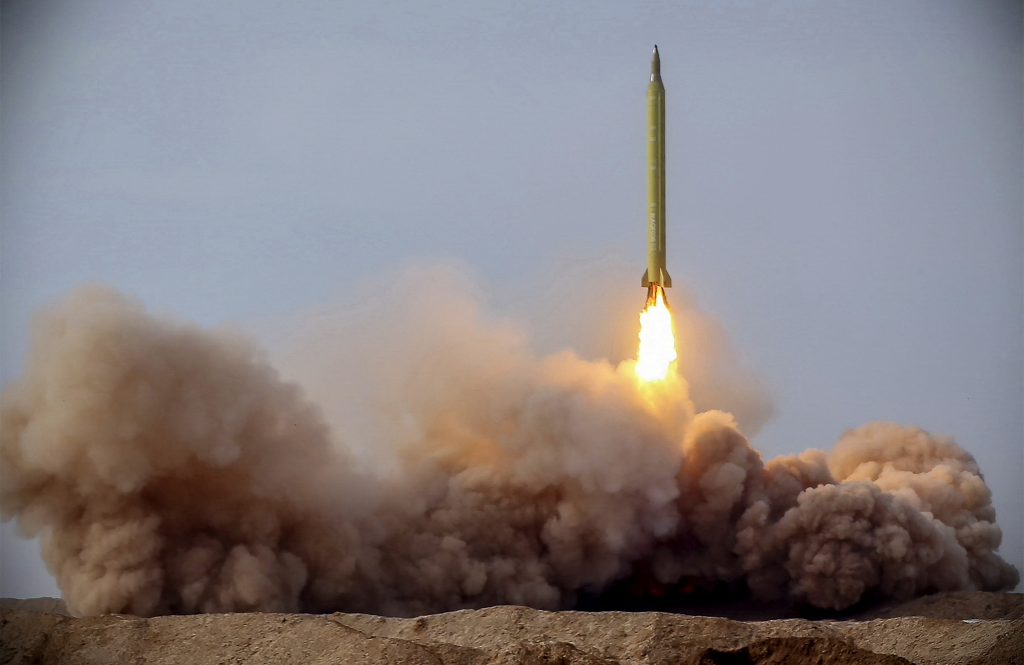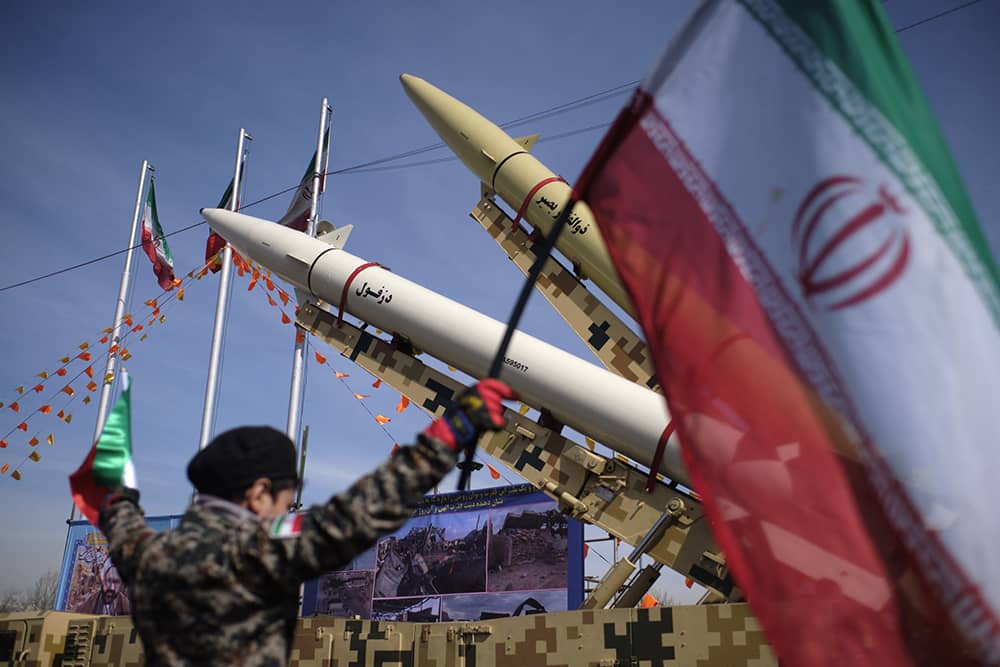The Biden administration seems to be on the wrong track. No strategy against the Islamic Republic of Iran can be effective without sustained coercive pressure. Going back in time, the situation is reminiscent of Ronald Reagan’s moment in history, when he came to believe that coercive measures would work to exploit Moscow’s weaknesses and help hasten the Soviet regime’s collapse. Similarly, the Biden administration should deploy a comprehensive set of coercive tools to combat the full range of Tehran’s malign behavior, including its nuclear advances, regional aggression, human rights abuses, and global terrorist networks. The short term objective: To hold and deter the regime. In the longer term: A presidential commitment to use American power to rollback and crack the Islamist regime.
Given Iran’s conduct, it is safe to assume that any US president would sooner or later need to make the same shift—turning away from reconciliation and adopting a more coercive posture toward the Islamic Republic. This policy shift is made even more urgent by the Islamist victory in Afghanistan. Minor sanctions, unarmed diplomacy, and ineffectual military strikes on Iran-backed militias that are known to have fired on US troops are the current hallmarks of Biden’s Iran policy. This is occurring while Washington is signaling its intention to move military assets out of the Gulf region, withdraw US troops from Iraq, and allow the Taliban to take over Afghanistan. Such an approach cannot possibly contain the clerical regime’s regional and nuclear aspirations.

A staff member removes the Iranian flag after a group photo during the Iran nuclear talks in Vienna, 2015. Photo credit: REUTERS/Carlos Barria
The Biden administration’s announced desire to go back to the 2015 nuclear deal, formally known as the Joint Comprehensive Plan of Action (JCPOA), is weakening American deterrence, as Tehran seeks to squeeze more and more concessions in the Vienna negotiations. President Biden is loath to respond to Iranian acceleration of uranium separation, at levels unmistakably designed to approach military capacity, as well as to the escalation of attacks by proxy across the region. A pattern of dangerous Iranian adventurism has also unfolded, including the firing of dozens of rockets at US troops by Iran-backed proxies in Iraq; the attempted kidnapping in New York of an American citizen by Iranian intelligence officers; the targeting of US and international shipping in the Gulf; and the attacks by Iran-backed proxies like Hamas, Palestinian Islamic Jihad, and the Houthis against US allies in the Middle East. None of this aggression, however, has produced a meaningful response from the Biden team, even after seven months of Iranian provocations.
The Biden strategy does not take into consideration the vast disquiet within Iran and the regular eruptions of anger toward the theocracy. In late 2017, nationwide protests began to consume the Islamic Republic, occurring regularly in the years since. In November 2019, an eruption of protests spurred the clerical regime to kill as many as 1,500 demonstrators, according to Reuters. In August 2021, protesters gathered to challenge the regime over severe water shortages, leading security forces to kill several people. Other protests since 2017 have challenged the full range of Iran’s malign policies, including its poor economy, corruption, regional expansionism, and human rights abuses. These developments have increased the vulnerability of the Islamic Republic, making it more susceptible to collapse.
Opponents of the clerical regime could benefit from an American strategy that combines deterrence in the short term and coercion in the medium-to-long term. For now, the strategy should be to “hold and deter”—until the current US administration, or a new one, would actively adopt a “rollback and crack” strategy to intensify the existing weaknesses of the regime and support its dissolution. The Reagan “victory” strategy against the Soviet Union, a nuclear-armed superpower, shows the way.
Hold and Deter
It is not clear that Supreme Leader Ayatollah Ali Khamenei will even allow his new president Ebrahim Raisi—a man after his own liking, and a mass executioner—to re-enter the JCPOA. If it happens, it will be a very different agreement than the one concluded in 2015. The Biden administration’s leading Iran envoy and chief negotiator, Robert Malley, already has conceded in the negotiations much greater sanctions relief than even former Secretary of State John Kerry and his chief negotiator Wendy Sherman agreed to in 2015. If former Iranian foreign minister Javad Zarif is to be believed, by mid-July, the US had agreed to lift sanctions on over 1,000 designated entities, including all Iranian banks except for one. Malley had also agreed to remove sanctions on the supreme leader and his close associates, and take the regime’s praetorians—the Islamic Revolutionary Guard Corps (IRGC)—off the list of foreign terrorist organizations. What will be left are minor, symbolic sanctions that will do little to interfere with the flow of billions of dollars to the clerical regime. And there could be more concessions to come as a new Iranian president and negotiating team squeeze Malley for more if negotiations resume.
On the nuclear side, Iran is enriching uranium at 60%, manufacturing uranium metal, accumulating large stockpiles of fissile material, testing more advanced centrifuges, and stonewalling the International Atomic Energy Agency’s inquiries about nuclear-related activities. Tehran is digging in its heels about maintaining its stockpile of advanced centrifuges, which are likely, at best, to be warehoused instead of destroyed. As JCPOA nuclear restrictions begin expiring in 2024, it is clear that Iran will have maintained pathways to nuclear weapons. By 2027, restrictions on the mass deployment of centrifuges, including advanced models, will begin to sunset with remaining restrictions gone by 2029. By 2031, there will be no cap on enrichment purity levels, including on weapon-grade uranium, as well as on stockpiles; enrichment will be permitted at the buried-beneath-a-mountain Fordow Fuel Enrichment Plant; new enrichment plants will be permitted; a plutonium reprocessing prohibition will be lifted; heavy water reactors will be allowed; and there will be no cap on heavy-water production or domestic stockpiling.

What is to be done? First, congressional voices on both sides of the aisle, US governors, private attorneys, as well as Israel and the Gulf states should use a combination of market and political deterrence to diminish the economic benefits from an American return to the JCPOA. Some congressional Republicans are already signaling to the market—through legislation, resolutions, and open or personal letters—that when they take back power they will reinstate sanctions and impose significant costs to anyone who has re-entered the Iranian market. Companies may only enjoy a few years of business opportunities before sanctions are returned. US governors can reinforce this market deterrence by expanding state laws to divest public pension funds from companies doing any business with the Islamic Republic. Private attorneys currently hold over $50 billion in outstanding judgments against the clerical regime on behalf of victims of Iranian terrorism. They should seek to attach these judgments to transactions between international companies and Iranian entities.
Israel also needs to protect its companies against the risk that they might inadvertently do business with Iran-linked entities. Jerusalem should publish its own comprehensive list of hostile entities that are engaged in supporting terrorism, missile and weapons proliferation, and human rights abuses, or are connected to Iran’s Islamic Revolutionary Guard Corps (IRGC), its military and other governmental entities. Given the Mossad’s reputation for Iran-related intelligence, this will be a reliable list for the compliance departments of major international banks and companies looking to stay clear of problematic persons, corporations, and other entities.
The Biden administration has made clear that if it suspends measures on banks and companies currently subject to US terrorism and missile sanctions, it will do so on a political basis—not because the conduct underlying those sanctions has changed. These will be unchartered waters for foreign financial institutions and investors who rely on the US Treasury Department’s sanctions list to protect them from business dealings with terror financiers and nuclear and missile proliferators. Hundreds of Iranian banks and companies will still be tied to terrorism, missiles, and the IRGC, despite the political decision to suspend sanctions—making the establishment of a new, internationally-respected terror and missile-finance watch list all the more important.
At the same time, Gulf states like Saudi Arabia, the United Arab Emirates, and Bahrain have market leverage they can deploy against companies doing business with the Islamic Republic. They can publish their own lists of malign persons and entities, duplicating or enhancing the Israeli list, and they can put companies to a choice between doing business with these Gulf countries or with the mullahs’ regime. Together, they have market power through the size of their sovereign wealth funds, their energy market, and the large defense, construction, infrastructure, technology and other contracts they award to international companies. Israel and non-governmental organizations can help by providing detailed information on pending contracts and discussions between international companies and Iranian entities.
Economic power is only part of the “hold and deter” strategy. With the Biden administration signaling its intention to move military assets out of the Middle East and its unwillingness to impose significant military costs on Iran and its proxies, Israel will increasingly be the only serious Western power in the region. The Mossad and Unit 8200, Israel’s signals intelligence and cyberwar division, have run circles around Iran’s security establishment through a successful campaign of covert action against Iran-related nuclear, military, and other assets. These have damaged Tehran’s atomic program, diminished Iranian regional capabilities in Syria, and have embarrassed the regime. The killing of Mohsen Fakhrizadeh, the chief of Iran’s military-nuclear program, and covert strikes against advanced centrifuge facilities and the Natanz nuclear site have bought Israel (and the world) some much-needed time. The 2020 killing of Iran’s most notorious military commander, Qasem Soleimani, in an American operation that relied on Israeli intelligence input, seriously undermined Iran’s regional aspirations. Hundreds of Israeli airstrikes against Iran-linked positions in Syria have prevented Tehran from opening up a third border from which to attack Israeli civilians and infrastructure. Israel’s intelligence agencies have also gone on offense against the regime’s infrastructure inside Iran.

Despite these successes, covert action probably will not be sufficient to stop the Islamist regime’s nuclear march. At some point, an Israeli government may decide that it has no choice but to launch military strikes. The biggest concern with this course of action is Jerusalem may well face a Biden administration ardently opposed to the use of force. And any suggestion from Jerusalem that it will only act with American consent implicates Washington if Jerusalem decides it must attack irrespective of past statements. This makes it more difficult for the Biden team to assert plausible deniability. The lasting anger in Washington, especially among Democrats, should not be underestimated.
In the meantime, the Biden administration is running a political-messaging campaign to deter Israeli action and to try and sideline JCPOA-skeptical Democrats like Senator Bob Menendez. The political campaign pivots on rhetoric about a “longer and stronger” nuclear deal that will correct the deficiencies of the original agreement. There is, of course, near-zero prospect for a better deal, as Tehran has made clear. But the rhetoric may be sufficient to neutralize some critical voices who do not want to have a big fight over America’s role in the Middle East. Republicans and Democrats in Congress will need to be clear-eyed about how unrealistic the administration’s rhetoric is about an improved deal.
Rollback and Crack
“Hold and deter” is only a short-term strategy. To keep the threat at bay, the American administration would need to take a page from the playbook Ronald Reagan first used against the Soviet Union. The strategy should be designed to rollback and crack the clerical regime.
In the early 1980s, President Reagan seriously upgraded his predecessors’ containment strategy by pushing policies that tried to roll back Soviet expansionism. The cornerstone of his strategy was the recognition that the Soviet Union was an aggressive and revolutionary yet internally fragile state that Washington could defeat. Reagan’s policy was outlined in 1983 in National Security Decision Directive 75, a comprehensive strategy that called for the use of all instruments of American overt and covert power. The plan included a massive defense buildup, economic warfare, support for anti-Soviet proxy forces and dissidents, and an all-out offensive against the regime’s ideological legitimacy.
The Biden administration—or, by 2025, perhaps a new president—should call for a new version of NSDD-75 and go on offense against the Iranian regime. The administration would be wise to address every aspect of the Iranian menace, not merely the nuclear program. President Obama’s narrow focus on disarmament paralyzed American policy. Obama’s engagement with the Islamic Republic as an end in itself suffered from the same delusions that American presidents entertained about Communist China. Those delusions of engagement made China wealthy and more powerful but did not moderate China’s rulers. The recent election of Raisi, a mass murdering cleric close to the supreme leader, who was elected by the lowest number of voters in Iran’s history, may sober up Team Biden to the unmistakable conclusion: The Islamic Republic cannot be reformed.

The IRGC test ballistic missiles at the Great Salt Desert, in January. Photo credit: SalamPix/ABACA via Reuters Connect
President Biden also should avoid the arms control trap that paralyzed Obama’s Iran policy. Under Obama’s nuclear accord, Tehran does not need to cheat to reach threshold nuclear-weapons capabilities. Merely by waiting for key constraints to sunset, the regime can emerge over the next decade with an industrial-size enrichment program, a near-zero breakout time, an easier clandestine “sneakout” path to long-range, nuclear-armed ballistic missiles, much better conventional weaponry, regional dominance, and a more powerful economy, increasingly immunized against Western sanctions.
Any new national security directive must indicate how to systemically dismantle Iranian power. Washington should demolish the regime’s terrorist networks and influence operations, including their presence in Europe and the US. The American offensive was underway during the Trump administration but it ran out of time: Mike Pompeo, then director of the CIA, put the agency on an aggressive footing against these global networks with the development of a more muscular covert action program and the green-lighting of much closer cooperation with the Mossad.
Most of Washington’s actions that could push back Tehran hinge on severely weakening the Islamic Republic’s finances. The Trump administration (and even the Obama-era Treasury) ran a successful economic warfare campaign targeting the IRGC and other regime elements that devastated Iranian government finances, led to hyperinflation, spurred a collapse in oil exports and the Iranian currency, and precipitated multiple rounds of street protests. In 2019 Khamenei called the US sanctions “unprecedented.” In the same year, the then Iranian president, Hassan Rouhani, compared conditions in Iran to the country’s devastating economic plight during the Iran–Iraq war from 1980 to 1988.
But Trump’s pressure campaign lasted only two years (from the snapback of sanctions in November 2018 to the end of the Trump administration in January 2021). If the Biden administration restores the JCPOA, much of that economic pressure will be reversed, as hundreds of the most economically potent sanctions are lifted. These will need to be reinstated.
Last but not least, the American pressure campaign should seek to undermine Iran’s rulers by strengthening the pro-democracy forces that erupted in Iran in 2009 and resurfaced from 2017 to 2021. It should target the regime’s soft underbelly: its massive corruption and human rights abuses, especially against women. Conventional wisdom assumes that Iran has a stable government. In reality, as the selection of Raisi and the boycott of his election by over 50% of Iranians (and protest ballots by another 20%) demonstrated, the gap between the ruled and their Islamist overlords is expanding. Many Iranians no longer believe that the “reformists” can change the Islamic Republic from within. After the 2009 uprisings, Khamenei alluded to his regime being “on the edge of a cliff.” A new Republican president should create the distinct impression that America will help to push it over that edge.
Other key voices in Iran have warned of the regime’s precariousness. In 2019 one Iranian lawmaker, Jalil Rahimi Jahanabadi, compared the regime’s predicament to the Soviet Union’s. “When the Soviet Union collapsed,” he told the Iranian parliament, “it had 13,000 nuclear warheads and had influence in more than 20 countries and a space station, but it was torn apart on the streets of Moscow, losing its security and territorial integrity.” Mohammad Reza Tajik, a political adviser to former president Mohammad Khatami, likened Tehran to the “Titanic in turbulent waters.”
To be sure, collapsing a brutally repressive regime like the Islamic Republic will not be easy or predictable. It will require sustained US pressure, a willingness to withstand international opprobrium, and a steely determination—perhaps over a period of years—to target the full range of Iran’s malign conduct. Yet cracking the regime remains a solution that Washington should not abjure merely because it is difficult. Ultimately, it remains the best and only way to reduce instability in the region and advance US interests.
The nuclear issue likely will loom large in the immediate future and the years ahead. A willingness to negotiate arms-control agreements (as Reagan did with Moscow) must never come at the expense of continuing a relentless campaign of pressure. Any American administration should present Iran with the choice between a new and better agreement and an unrelenting American pressure campaign, which includes the credible use of force against an expanding nuclear program.
Washington does not need to have a public strategy to collapse the clerical regime; Reagan did not have one for the USSR. Our political leaders should only talk about the inevitability of the fate of the Islamic Republic. An ideologically, politically, and economically bankrupt regime, it will end up on the “ash heap of history.” Reagan spoke that way about the Soviet Union in his famous 1981 Westminster speech. In 1983, he released NSDD-75. Only seven years later, the Soviet bloc collapsed. Washington should intensify the pressure on the mullahs as Reagan did on the communists. We would be far better off this time round, of course, not to have a dogged enemy armed with atomic weapons if we can possibly avoid it.



